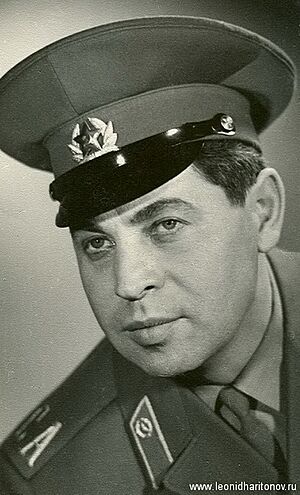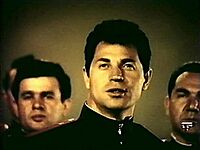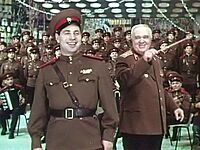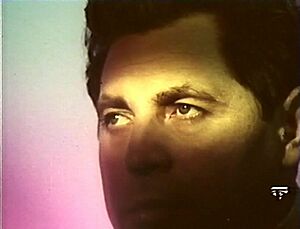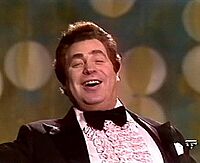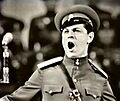Leonid Kharitonov (singer) facts for kids
Quick facts for kids
Leonid Kharitonov
|
|
|---|---|
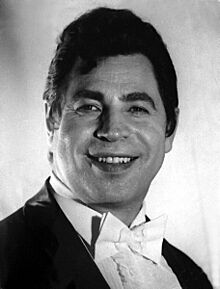
Leonid Kharitonov, 1970s
|
|
| Background information | |
| Birth name | Leonid Mikhailovich Kharitonov |
| Born | 18 September 1933 Irkutsk, Russian SFSR, Soviet Union |
| Origin | Golumet, Irkutsk, Russia |
| Died | 19 September 2017 (aged 84) Moscow, Russia |
| Genres | Opera, Romantic music, military music, ethnic Russian music, easy listening, middle of the road, folk music, comic songs |
| Occupation(s) | Alexandrov Ensemble soloist, operatic and concert bass-baritone soloist, Soviet Army (private) |
| Years active | 1953–2017 |
| Labels | Kultur, EMI, Melodiya etc. |
| Associated acts | Alexandrov Ensemble, Red Army Choir, Moscow Philharmonic Society |
Leonid Mikhailovich Kharitonov (Russian: Леонид Михайлович Харитонов; 18 September 1933 – 19 September 2017) was a famous Soviet and Russian bass-baritone singer. A bass-baritone has a voice that is deep like a bass but can also reach higher notes like a baritone. He was honored with important titles like People's Artist of the RSFSR. In other countries, he was well-known for his 1965 video of "The Song of the Volga Boatmen".
Contents
Early Life and Musical Start
Leonid Kharitonov was born in Golumet, Irkutsk Oblast, in 1933. His father went missing during World War II, so his mother raised him. He attended school in Cheremkhovo and Golumet.
From age 14, he trained as a welder and worked at a plant. By 1948, he was working as an electric welder in Golumet. Around this time, he also started performing as a singer.
When he was 17, he became a soloist at the Irkutsk Philharmonic. Even though he didn't have a high school diploma, his powerful singing voice helped him get accepted into the Moscow Conservatory in 1952. He studied there until 1955.
A Career in Music
Singing with the Alexandrov Ensemble
From 1953 to 1965, Leonid Kharitonov was part of the choir in the Red Song and Dance Ensemble of the Soviet Army. This group is also known as the Alexandrov Ensemble. He served in the Red Army and the choir at the same time from 1953 to 1955.
While still in the choir, he studied at the Gnessin State Musical College from 1956 to 1959. His first public performance as a soloist was in 1965 at the State Kremlin Palace. This was a special day because his friends, cosmonauts Pavel Belyaev and Alexei Leonov, went into space. Leonov even became the first person to walk in space during this mission.
Kharitonov became an official soloist on April 22, 1965. In 1967, he received the title of Honoured Artist of Russia. He stayed with the Ensemble for almost 20 years, until 1972. The Ensemble's leader, B.A. Alexandrov, was very proud of him. Kharitonov sometimes sang duets, but only with Ivan Bukreev. His only singing teacher was Evgeny Avgustovich Kanger, who taught only the top soloists.
Independent Career and Tours
From 1972 to 1998, Leonid Kharitonov was a soloist with the Moscow Philharmonic Society. This meant they arranged his tours and bookings. In 1986, he was awarded People's Artist of the RSFSR, a very high honor for artists in Russia.
He often performed on radio and television. He toured all over Russia and sang many times at the State Kremlin Palace concert hall. He was seen as a source of pride for Russia. He performed at concerts for the government and for visitors from other countries.
During the 1970s, 80s, and 90s, Kharitonov toured many countries. These included Czechoslovakia, England, Scotland, the United States, China, and Australia. From 1998 to 2006, he continued to perform at different places. He gave concerts in Siberia, at the German Embassy, and at the Ilya Glazunov Gallery. He never performed in full theatrical operas, but he sang opera songs in concert.
Global Recognition
Like many great Russian singers from the Soviet era, Leonid Kharitonov was not very well-known in Western countries. This was mainly because of the Cold War. However, his recordings are still being released around the world. Thanks to platforms like YouTube, more people are now discovering his amazing voice.
Famous Performances
"Cliff" (1965)
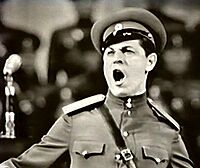
"Cliff" (Utyos in Russian) was one of Kharitonov's first solo performances. He was 32 years old and had been in the Ensemble's choir for twelve years. He sang this song at the Kremlin Palace of Congresses for important government officials.
As a bass singer, he understood how important the bass part is in music. It provides a strong foundation for the song, especially when there are no instruments. Kharitonov's performance of "Cliff" was very powerful. He set the melody and energy, and the choir followed his lead. The song built to a big moment, showing the hopeful spirit of Russia. This song is about Stenka Razin, a famous revolutionary. His performance even made Leonid Brezhnev cry!
"Song of the Volga Boatmen" (1965)
In Western countries, Kharitonov is most famous for his 1965 video of "The Song of the Volga Boatmen". The proper title is "Yo, Heave, Ho!" (Ej, uhnem! in Russian). His performance was similar to the famous singer Chaliapin's 1922 recording. Especially in the high notes, his voice showed the great effort of the boat haulers.
He showed the clear Russian bass-baritone sound, which combines different styles. It has the clear, strong sound of Eastern Orthodox Church singing. It also has the power and control of Italian opera singing. Russian speakers often make certain vowel sounds that help their bass voices sound rich and open. This helped Kharitonov's voice sound amazing in both high and low notes.
Throughout the song, his serious face showed the hard work of the burlaks (boat haulers). But for a moment, he would lighten up, even showing a slight smile, when he sang: "We are singing our song to the Sun." This is arguably the most hopeful part of the song.
"Dark-Eyed Cossack Girl" (1969)
Many Russian songs are serious, but Kharitonov also performed funny songs. The composer Matvey Blanter wrote "Dark-Eyed Cossack Girl" (Chernoglazaya Kazachka in Russian) just for him in 1966. Kharitonov's best performance of this song was recorded in 1969.
In this song, he showed his humor, like Chaliapin did in his performances. Even though the song involves laughter, Kharitonov laughed elegantly and stayed in tune. He made funny faces and gestures, but his voice always stayed perfect. This performance showed that even with humor, singing needs great discipline and skill.
"Shine, Shine My Star" (1974)
In this song, "Shine, Shine My Star" (Gori, Gori, Moya Zvezda in Russian), the singer talks to a star, asking for its kindness. Kharitonov sang it like a prayer. The close-up of his face showed the deep spiritual feeling of his performance.
In an interview, Kharitonov spoke about his faith. He said that even as a child, he felt a connection with the sky and the universe. He believed his star spoke to him. He felt that God guided him through difficult times and taught him to understand good from bad. He believed that an artist's true self comes through in their performance.
"Along the Peterskaya (Street)" (1983)
"Along the Peterskaya" (Vdol po Piterskoy in Russian) is a folk song about a cheerful, tipsy troika-driver. Other famous singers like Feodor Chaliapin and Alexei Sergeev had also made this song popular.
Kharitonov's version of the tipsy driver was like a big, friendly Russian Bear, a symbol of Russia. Even at 50 years old, his voice was still strong and clear. He could surprise the audience by taking a serious singing style and using it for a funny, lighthearted song. This performance showed his great skill in comedic singing.
Reviews from Critics
- In 1967, The Times newspaper said that Leonid Kharitonov sang "magnificently" during the Ensemble's UK tour.
- L’Aurore newspaper in France, also in 1967, praised his "impressively full sonorousness" as he moved from the choir to a soloist.
- In 1977, Soviet Weekly mentioned his great success with the "Volga Boat Song" in Britain.
- The Sunday Post in Scotland, in 1977, described him as "Built like the side of a house, with a voice to match." It noted he could sing without a microphone and fill the entire hall with his voice.
- In 1979, Yorkton this week reported that the audience gave Kharitonov a standing ovation for his art.
- Moscow Magazine in 2001 called him an "enchanting bass and an amazing dramatic actor."
- In 2003, Russian Messenger stated that his performances around the world created new interest in Russian songs. It even said he was named "Best Singer of the Year" in France in 1967, competing with world stars like The Beatles.
- A 2006 review in Kopeck described his voice as so powerful that even without a microphone, people in the back rows could hear every word clearly.
- In 2006, Moscow Truth shared a story from an interviewer who learned from Kharitonov that it's important to make your story interesting so the audience doesn't get bored.
Personal Life and Legacy
Leonid Kharitonov had two sons and lived in Moscow for most of his career. In 2008, he helped return an icon (a religious image) of Saint Nicholas to a church in his hometown of Golumet.
On September 25, 2017, his son, Mikhail Kharitonov, announced sad news. Leonid Mikhailovich Kharitonov passed away on September 19, 2017, just one day after his 84th birthday. He had suffered his fifth heart attack. His son shared one of Leonid Kharitonov's favorite songs, "Shine, Shine my Star," as a farewell.
Recorded Music
With the Alexandrov Ensemble
With the Alexandrov Ensemble, he recorded many songs, including:
- "The Ballad about Russian Boys"
- "John Reed Walks Around Petrograd"
- "War isn't Over Yet"
- "Here Lenin Lived"
- "Lenin's Guard"
- "My Fatherland"
- "Veterans don't Grow Old in their Souls"
- "Song of Peace"
- "Gray Hair"
- "Son of the Fatherland"
- "Son of Russia"
- "Vasya-Vasilyok" (a duet with I.S. Bukreev)
- "Song of the Volga Boatmen"
- "Death of Varyag"
He also sang a duet with French singer Mireille Mathieu called "Quand fera-t-il jour, camarade?". This was recorded in France but was never officially released.
Discography
Recordings from 1972 Onwards
You can find a full list of his recordings on Leonid Kharitonov's official website.
Recordings from 1965 Onwards
All his recordings from 1965 to 1972 are listed in the Alexandrov Ensemble discography section of the Japanese "Red Army" website. This site also lists individual songs by Kharitonov and links to full album details.
Concert Songs
Here are some of the opera songs he performed in concerts:
- Ivan Susanin from Life for the Tsar by Glinka
- King Rene from Iolanta by Tchaikovsky
- Song of the Varangian Guest from Sadko by Rimsky-Korsakov
- King Philip from Don Carlos by Verdi
- Konchak from Prince Igor by Borodin
- The Old-Man's Tale from Aleko by Rachmaninov
- Kutuzov from War and Peace by Prokofiev
- Serenade of Mefistofeles from Faust by Gounod
- Song of the Flea by Mussorgsky
Images for kids
-
Kharitonov singing Cliff at the Tchaikovsky Hall, Moscow, 1965
 | Janet Taylor Pickett |
 | Synthia Saint James |
 | Howardena Pindell |
 | Faith Ringgold |


